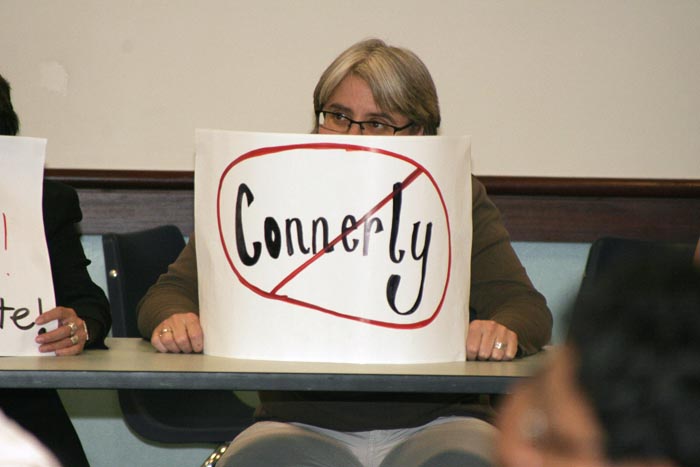Prop 209 speaker faces protesters
A faculty member holds a sign protesting Connerly’s speech against affirmative action.:Johnson, Steven
May 14, 2007
What was scheduled to be a regular Thursday meeting for the Sacramento State College Republicans at the Orchard Suite turned into a protest where students fought against a speaker’s support of a proposition that calls for the elimination of affirmative action, the encouragement of increased representation of women and minority groups.
Ward Connerly, a proponent of Proposition 209, was invited to Sac State by the student organization to speak about his advocacy for the proposal. Before he could even speak before his audience, he unexpectedly came face-to-face with nearly 80 students and faculty from Sac State in opposition to his plan that they just recently became aware of.
“This guest promotes the club’s mission on campus: to challenge the liberal campus bias and spark debate among students and faculty alike,” said Tyler Rico, president of Sac State’s College Republicans in a press release. The proposition was initially proposed to California voters in 1996, where it did pass with 54 percent approval, according to the Pacific Research Institute website.
Proposition 209 “prohibits the state, local governments, districts, public universities, colleges, and schools, and other government instrumentalities from discriminating against or giving preferential treatment to any individual or group in public employment, public education, or public contracting on the basis of race, sex, color, ethnicity, or national origin,” according to the California Secretary of State’s website.
Connerly said in the next five to 10 years, affirmative action will be dead.
He then called those students against his proposition a “mob.”
“I believe treating people differently on the basis of race or skin color is wrong. That is why I proposed Proposition 209?We’re supposed to have equal rights. The government should have set that standard without regard to race or color,” Connerly said.
He said everyone should focus more on socioeconomic deficiencies, instead of “race-based decision making,” by getting more people to apply to universities who are eligible and striving to be more competitive.
“Civil rights belong to all of us, and that’s the lesson our country has to learn,” Connerly said.
California Faculty Association chapter President Cecil Canton said students need to know what Connerly stands for.
“(Sac State) is a campus that is supposedly diverse. It is important to let the community be exposed to his views and debate against him if necessary,” Canton said.
Senior social work major Dezarae Johnson said she was curious to hear what Connerly had to say, adding she does not understand why he wants to cut off all of the employment and educational opportunities minorities have been able to receive.
Graduating senior majoring in biological sciences Assabi Isaac said her intentions were to make the guest speaker feel un-welcomed, as she disagrees with the proposition.
“Proposition 209 sets major setbacks for women and minorities. That is not in line with civil rights,” Isaac said.
Protesters at the event were angry that Connerly was invited to Sac State, a campus where diversity is stressed heavily. Protesters view Connerly as a black male who publicizes himself as a leader in civil rights, but does not in actuality support diversity.
“Our diversity is the gem of our university,” said Robert Marcelis, a sophomore government major and member of College Democrats.
Associated Students Inc. Director of Social Sciences and Interdisciplinary Studies and member of the College Republicans Ryan Christensen showed his disgust in the large group of protesters as he stuck his tongue out at the crowd.
Christensen declined to comment on the matter.
Before the large group of students and faculty settled inside the Orchard Suite, many were denied access inside the room. As a result, they resorted to waving their signs and chanting in the hallway in front of its doors, until the walls were expanded in order to accommodate more people and promote an environment where all were invited to listen and speak.
Bailey Mannisto-Iches contributed to this article
Jacqueline Tualla can be reached at [email protected]





























































































































